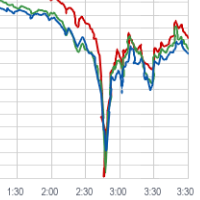Other Nations Begin to Regulate Stock Market High-Speed Trading, but not U.S.
 Flash Crash May 6, 2010 (graphic: CNBC)
Flash Crash May 6, 2010 (graphic: CNBC)
Having observed what high-frequency trading has done to U.S. markets, foreign governments are doing what American officials have avoided: regulate.
In traditional stock trading, a buyer, through a broker, purchases shares in a stock with the hope that over time they will grow in value. In high-frequency trading, institutional investors use computerized programs to buy stocks and then sell them within hours, minutes or even seconds, taking advantage of slight fluctuations in value.
On May 6, 2010, U.S. markets were disrupted by a “flash crash” that sent the Dow Jones average plummeting more than 600 points in a matter of minutes, before coming back again almost as quickly. On August 1 of this year, The Knight Capital Group lost $440 million in 45 minutes as a result of a computer glitch and sent the trading firm to the brink of bankruptcy.
In Germany, lawmakers are considering legislation that would require high-speed trading firms to register with the government. The bill would also limit the firms’ ability to quickly execute orders, which cuts to the essence of why the firms became successful in the first place.
The European Parliament is debating a similar plan that would have to be approved by the member states of the European Union.
A leading Australian official has discussed bringing high-speed trading firms under tighter regulation and mandating they perform “stress testing” to ensure their activity does not disrupt markets.
Meanwhile, Canada has adopted fees that the firms must pay if trading exceeds a certain level. Also, new rules going into effect in October will seek to limit the growth of “dark pools,” secretive trading venues that operate outside conventional stock markets.
Greg Mills, head of stock trading at Canada’s largest bank, said his country took action on high-speed trading because, “We don’t want to look like the U.S., but we have to do it better than we are now.”
Meanwhile, in the United States, big banks and other firms that have profited from high-frequency trading have successfully resisted regulation.
-Noel Brinkerhoff, David Wallechinsky
To Learn More:
Beyond Wall St., Curbs on High-Speed Trades Proceed (by Nathaniel Popper, New York Times)
Like Athletes who Dope, Wall Street’s High-Speed Traders Try to Keep Ahead of Regulators (by Noel Brinkerhoff, AllGov)
How Goldman Sachs Made $100 Million a Day in a Flash (by David Wallechinsky, AllGov)
- Top Stories
- Unusual News
- Where is the Money Going?
- Controversies
- U.S. and the World
- Appointments and Resignations
- Latest News
- Musk and Trump Fire Members of Congress
- Trump Calls for Violent Street Demonstrations Against Himself
- Trump Changes Name of Republican Party
- The 2024 Election By the Numbers
- Bashar al-Assad—The Fall of a Rabid AntiSemite






Comments